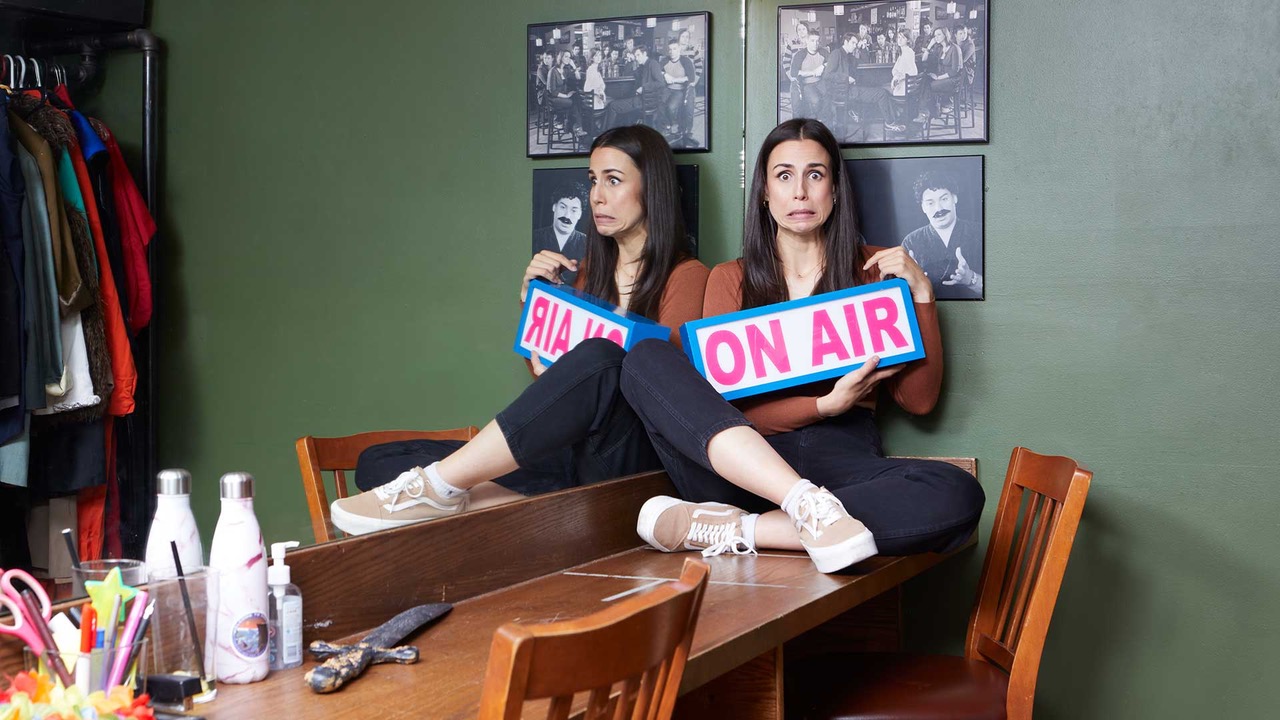By: Meghan Yuri Young Photography: Samuel Engelking Stand-up comedian Allie Pearse’s fascination with relationships and her biographical approach to comedy make for relatable material that encompasses life’s good, bad, but mostly dirty. It’s midday and…
By NowPlayingToronto
By: Meghan Yuri Young
Photography: Samuel Engelking
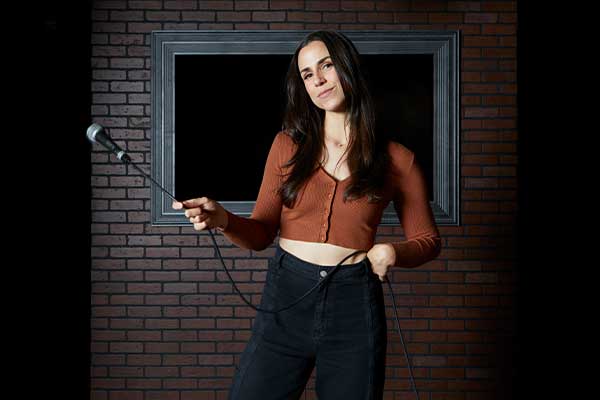 It’s midday and light is faintly filtering into a basement bar known more for its laughs than its drinks. Comedy Bar at Bloor and Dovercourt also happens to be Allie Pearse’s second home. Adjacent to a mic, unfazed by the bright lights pointed directly at her, she’s familiar with this stage because it’s where she has honed her craft. It’s a craft that the Montreal-born, Toronto-based comedian brings to comedy venues across the city.
It’s midday and light is faintly filtering into a basement bar known more for its laughs than its drinks. Comedy Bar at Bloor and Dovercourt also happens to be Allie Pearse’s second home. Adjacent to a mic, unfazed by the bright lights pointed directly at her, she’s familiar with this stage because it’s where she has honed her craft. It’s a craft that the Montreal-born, Toronto-based comedian brings to comedy venues across the city.
Meghan Yuri Young: Well, I’m embarrassed to say I’ve never been to Comedy Bar. Tell us why you wanted to meet here.
Allie Pearse: This is my favourite club in the city. I would say it’s my home club. It’s such an amazing place because it’s very unique in that there are two separate spaces. Instead of having one singular booker, each show is independently produced by comedians — people who love comedy. It allows each show to have a completely different feel. It just totally diversifies the lineups and the types of shows the audiences come to. I feel like there’s something for everybody here, which is why I love it so much.
MYY: I interviewed Just for Laughs (JFL) festival producer, Oz Weaver, and what you’re saying actually echoes how he described JFL Toronto: diverse in voices and also programming. Comedy is so broad because Toronto itself is so broad.
AP: I don’t think it’s an accident that JFL uses this venue a lot. I think that’s absolutely true. Toronto is such a diverse city, and comedy here is also really diverse. There’s no one way to do stand-up, and I think what venues like this really show people is that you may have been turned off by comedy at some point … but there’s options. The landscape of comedy is evolving so quickly, especially in the last decade. I think this venue, in particular, is a really good representation of that.
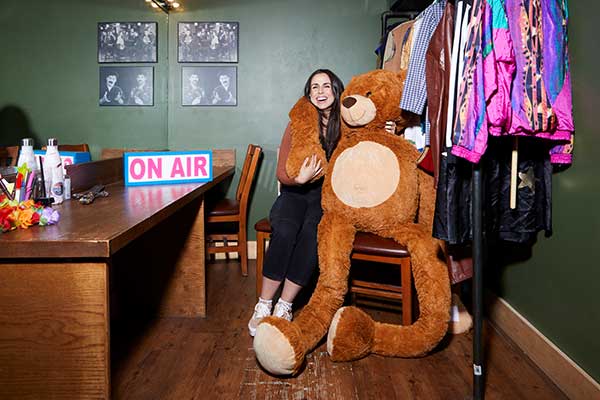 MYY: I love that! We’re here to learn more about you. For anyone who’s not familiar, can you tell us a little bit about yourself?
MYY: I love that! We’re here to learn more about you. For anyone who’s not familiar, can you tell us a little bit about yourself?
AP: I’m originally from Montreal. I came to Toronto, oh my gosh, I think 13 years ago now. I came on a whim, and I was like, “I’ll just stay for a couple months” and then I never left. I think that’s a pretty big testament to the city. Originally, I was interested in pursuing acting and then I found out that I was a really bad actor. I studied theatre in college. I always leaned into the funny stuff. But when you’re in theatre school, you’re only performing Arthur Miller, and everyone’s in the middle of a personal tragedy… But this is what I love about stand-up, you get to turn that personal tragedy into something that people can connect with. So, I think the original light bulb moment was when I went through a breakup. I feel like that’s the origin story of most comedians. I was like, “Okay, what am I gonna do with all this pain?”
I knew that Second City did classes, so I took a class and it pushed me to get on stage for the first time. But even after that, I was like, “I can’t do this.” I took another pause for several years [until] I was going through a huge transitional period in my life again, and I remembered that was a thing that made me really happy. I went to a real open mic … [but] even then, I was really just dipping my toes. I decided to work for Just for Laughs [in Montreal] as a logistics coordinator. I did one contract with them for a summer. While I was there, I knew I was on the wrong side of it. When I came back to Toronto, I went full force into stand-up.
MYY: I love how experimental and adventurous you were while also being mindful of the process. How did you overcome that and what makes you keep coming out to perform?
AP: That’s a great question. There are things that keep all of us up at night … Whatever you think about that gnaws away at you, I probably think some of the same things. If I feel it, someone else has to feel it too. I’ve said some things on stage that are really out there, and suddenly, someone in the audience will be howling. Instantly, I know I’m not alone.
By the way, I’m still always terrified when I go on stage. I’m still very much working through that. Some shows, [I feel it] more than others, obviously. In the early days, it was very much like, “Okay, how do I calm myself enough just to be able to say these things out loud?” Then it was, “How do I actually connect with somebody?” Then it was, “How do I have fun and have a conversation as opposed to just talking at people?” It’s always a journey I’m coming in and out of when I’m on stage. It’s such a unique thing and it’s so hard to describe, but it is extremely satisfying when it works.
MYY: Speaking of your shows, how would you categorize your comedy?
AP: I would say it’s very biographical. It definitely veers, I guess, a little bit dirty. I hate that that’s the category it gets lumped into. My fascination in life is relationships. I’m so interested in relationships of every single kind. I also think, going back to what we were just saying, there is a nervousness on stage just in general because no one wants to look stupid. We’re so used to being part of a pack. When you separate from the pack, you’re putting yourself in this very vulnerable position and it is nerve-racking.
As a woman, I’m talking about things that are typically a little bit taboo, not nearly as much as they were a decade ago, but I always fear, and it has happened, someone slut-shaming me; or taking me apart as a woman; or trying to, like, put me in my place. There have been a couple of weird interactions on stage. But then it’s doubly satisfying when it does work because it’s like, we’re all moving in this direction together.
MYY: What are Toronto audiences like?
AP: I’ve also definitely performed in smaller towns and, like, legions. You walk in and you think, “This is probably not gonna fly.” The thing I will say is, again, I don’t want to assume that people are not going to like it because then I’m just shooting myself in the foot before I start.
That said, connection is the key to me. People always remind me … that everyone has a private life. I think it’s so important to not write people off. It’s this thing of shame that I think a lot of us deal with in different capacities. It’s quieting that and saying, “I am going to choose not to subscribe to that.” If someone wants to come have a conversation with me about it after the show, that’s all good.
MYY: Beyond Toronto audiences, how do you find the stand-up comedy scene in Toronto?
AP: First of all, the scene in Toronto is massive. As far as Canada, it really is the hub of comedy … There’s a volume here that I don’t think is replicated elsewhere. You can do five shows a night here if you want to. The talent here is just so strong and the community is very supportive.
There’s this merging when JFL comes here. You have these massive headliners who are selling out arenas but you’re crossing paths with them as you’re doing these smaller shows.
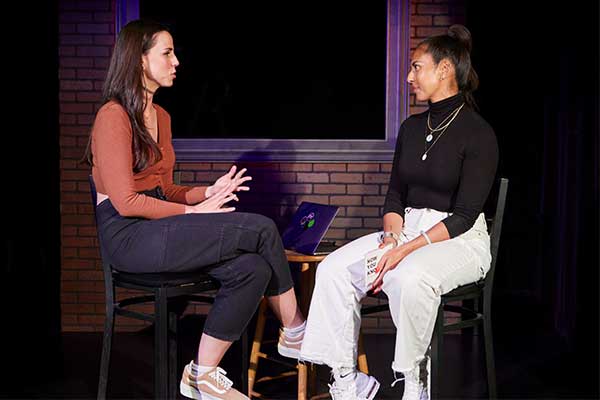 MYY: That’s so exciting!
MYY: That’s so exciting!
AP: It’s really exciting … There’s something very homegrown about [JFL Toronto] that I think audience members … feel when they’re here. You’re just rolling out of your house and going to a show. You have no idea who’s gonna be on it. It’s really special … There’s just so many great comedians here, and I think it’s really exciting to see them flourish.
There seems to be, like, this boom of recognition for Canadian artists once they leave. What’s so great about JFL is they’re saying, “They’re here now. Come see them now.”
MYY: For those who are looking to have a full night or day out in Toronto, what are some local hotspots you’d recommend?
AP: Well, we all know I’m a fan of Comedy Bar. This is a great place to come for any show, and there’s so many cool restaurants and bars in this neighbourhood. There’s Civil Liberties, a cocktail bar at Bloor and Ossington. [Another great venue is] called Nothing Fancy. They actually opened as a bar during the pandemic. They started running comedy shows on their back patio because, well, why not? That was the only thing that you were allowed to do. It accidentally became a comedy club. So, they rebranded as one and actually outgrew [their original] space. They’ve since moved to this amazing venue in Kensington Market. There’s also a Filipino barbecue restaurant upstairs. It’s a one-stop shop!
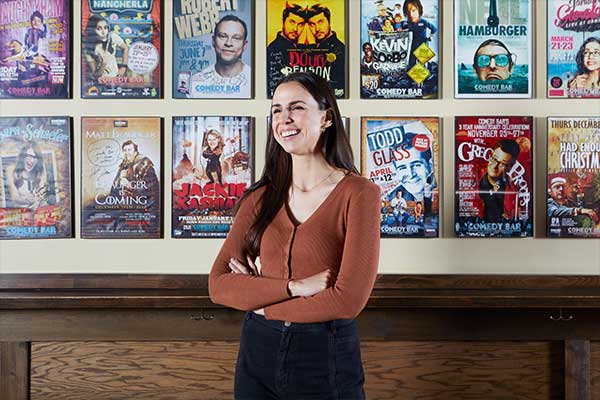
MYY: What can others look forward to when it comes to your work?
AP: I really want to hit some cities outside of Canada that are big for stand-up. I haven’t been to New York in years, so I’m excited to go back and really explore the city from a comedy-specific lens. Then, I want to do a Canadian tour because I think that really forces you to grow as a comic in a way that you don’t necessarily get within the city limits.
After you check out the current comedy shows happening in Toronto, read our blog about iconic and new places to see comics in the city.

